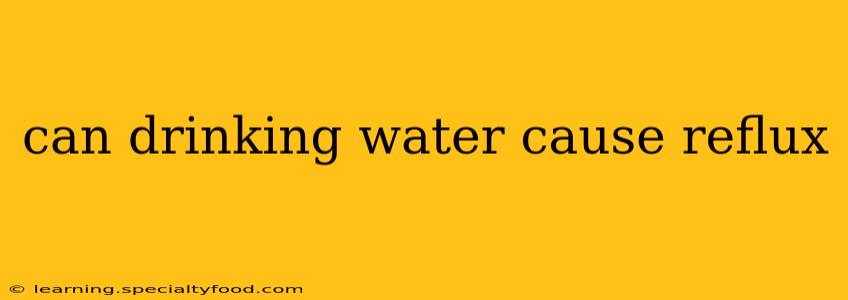Many people experience heartburn or acid reflux, that uncomfortable burning sensation in the chest. While it's often associated with spicy food or large meals, some wonder if even something as seemingly benign as water can trigger this unpleasant symptom. The short answer is: it's complicated, and the relationship between water intake and reflux isn't straightforward. This article will delve into the nuances of this question, exploring the potential causes and offering advice on managing acid reflux.
Does Drinking Water Increase Stomach Acid?
This is a common misconception. Drinking water itself doesn't directly increase stomach acid production. Your stomach naturally produces acid to digest food, and this process isn't significantly affected by the consumption of plain water. However, the timing and volume of water intake can indirectly influence reflux symptoms.
Can Drinking Too Much Water Cause Reflux?
While water doesn't increase stomach acid, drinking excessive amounts of water, especially rapidly, can distend the stomach. This over-distension can increase pressure within the abdomen, potentially pushing stomach contents back up into the esophagus—the tube connecting the mouth to the stomach. This is particularly true if you already have a weakened lower esophageal sphincter (LES), the muscle that normally prevents stomach acid from refluxing. A weakened LES is a common cause of Gastroesophageal Reflux Disease (GERD).
Can Cold Water Cause Reflux?
There's no scientific evidence to directly link the temperature of water to acid reflux. While some individuals report worsened symptoms after consuming cold water, this is likely anecdotal and possibly related to other factors, such as the overall volume consumed or pre-existing digestive sensitivities.
Does Drinking Water Before Bed Cause Reflux?
Drinking large quantities of water close to bedtime can potentially worsen reflux symptoms. Lying down after drinking a significant amount of water increases the pressure on the stomach, potentially leading to reflux. It's generally recommended to avoid large fluid intake before sleep.
What Other Drinks Can Trigger Reflux?
Many beverages can exacerbate acid reflux symptoms. These include:
- Carbonated drinks: The carbonation increases stomach pressure.
- Alcoholic beverages: Alcohol relaxes the LES, increasing reflux risk.
- Caffeinated drinks: Caffeine can stimulate acid production and relax the LES.
- Citrus juices: The acidity can irritate the esophageal lining.
- Tomato-based juices: Tomatoes are a common trigger for reflux.
How Can I Reduce My Reflux Symptoms?
If you experience frequent acid reflux, consider these strategies:
- Maintain a healthy weight: Obesity increases abdominal pressure.
- Eat smaller, more frequent meals: This prevents over-distension of the stomach.
- Avoid trigger foods and drinks: Identify and eliminate foods and drinks that worsen your symptoms.
- Elevate the head of your bed: This helps prevent stomach acid from refluxing while sleeping.
- Quit smoking: Smoking weakens the LES.
- Consult a doctor: If your symptoms are severe or persistent, consult a healthcare professional for proper diagnosis and treatment.
Conclusion: Water and Reflux – A Nuanced Relationship
In conclusion, while water itself doesn't directly cause acid reflux by increasing stomach acid, excessive consumption or drinking water close to bedtime can indirectly contribute to the problem by increasing abdominal pressure. Understanding this nuance is crucial in managing reflux symptoms. Remember that individual responses to water intake can vary, and paying attention to your body's signals is essential. If you have persistent or severe reflux, seeking medical advice is always the best course of action.
